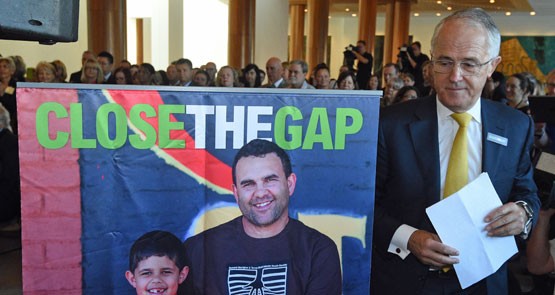
Efforts to significantly improve health, social and educational outcomes for Aboriginal and Torres Strait Islander Australians has stalled in a number of key areas, the 2016 Closing The Gap report shows.
The report, tabled in Parliament this morning by the Prime Minister, identifies very mixed results since 2015 across a range of key indicators.
- child mortality is down and we are on track to halve child mortality by 2018, and Aboriginal and Torres Strait Islander children have higher immunisation rates than other Australians, but progress on increasing overall indigenous life expectancy to that of other Australians by 2031 is not on track — the report notes that “the Indigenous mortality rate in 2014 is above the required trajectory to meet the target”;
- there has been minimal improvement in school attendance by Aboriginal and Torres Straight Islander children, placing at risk the goal to increase school attendance rates to those of other Australian children by the end of 2018 — attendance is below 84% compared to 93% for non-indigenous students;
- we are well short of the goal for 95% of all indigenous four-year-olds to be enrolled in early childhood education by 2025 — 85% in remote communities are enrolled, 74% in regional communities and 67% in cities;
- the goal to lift indigenous students’ achievements in reading, writing and numeracy to similar levels as those of non-indigenous Australians by 2018 is on track in four out of eight areas, with much better progress in metropolitan communities than rural and remote communities;
- the goal to halve the gap for Indigenous Australians in Year 12/equivalent attainment by 2020 is on track, although there’s a lack of new comprehensive data;
- there is no new data for the goal on halving the gap in employment outcomes by 2018 but the government acknowledges it is not on track to be met, saying “Indigenous employment rate fell from 53.8 per cent in 2008 to 47.5 per cent in 2012-13. This occurred in the context of a general softening in the labour market over this period” and quoting the Productivity Commission’s 2015 finding that “Aboriginal and Torres Strait Islander Australians have almost certainly been more adversely affected by recent cyclical softness in the labour market”.
The Prime Minister appeared to heed calls from community figures such as Mick Gooda, Jackie Huggins and Stan Grant that there needed to be greater engagement with indigenous communities if Closing The Gap outcomes were going to be improved. At this morning’s parliamentary breakfast for the 10th anniversary of Closing The Gap, Turnbull said:
“The message I’ve heard most consistently from Aboriginal and Torres Strait Islander people is their desire to work in partnership with government in a relationship based on mutual respect … And so we need to listen to and draw on the wisdom, the ingenuity, the insights of indigenous people across the nation from the cities to remote communities … we have to redouble our efforts to ensure effective engagement between the government, Aboriginal and Torres Strait Islander people to build trust and develop further that respectful relationship. Now as we continue to develop and refine those policies, again, I can’t stress enough how important it is to allow decisions to be made closer to the people and the communities which those policies impact.”
After Tony Abbott last year declared the 2015 report “in many respects, profoundly disappointing,” and warned in 2014 that “we are not on track to achieve the more important and the more meaningful targets”, this year’s report confirms that without some significant change in approach, Australia is in danger of failing to achieve Closing The Gap goals across a range of critical areas.








Perhaps if we re-framed “Closing the Gap” as “Paying the Debt” we would initiate a different narrative which places the blame for ‘the gap’ squarely where it belongs, namely in the horrendous policies and treatments meted out to our indigenous people over the last two hundred years. It might also initiate a different set of policies for dealing with it, namely reparations for the harm done.
I’m from the government and I’m here to help..
I feel sorry for the ingénu taken in by this mob – for their votes.
Malcolm’s so serious about it this time he had Ken Wyatt sit behind him in Parliamentary camera shot as he waxed lyrical about it – trumping Shorten (Peris was in the Senate Chamber)?
Until the Chattering Classes are able to put aside their P.C. prejudices and examine what Factor Analysis (rather than mere correlations) tell us, many disadvantaged groups such as the indigenous, the working class, etc., suffer, there’ll be no worthwhile improvements.